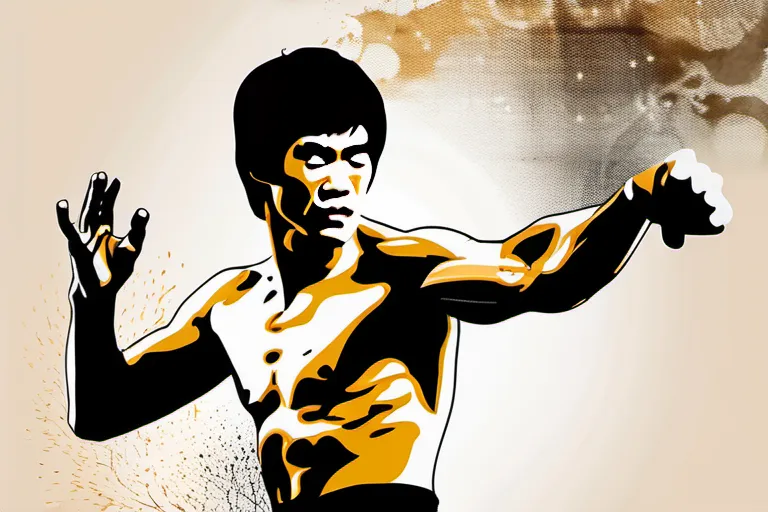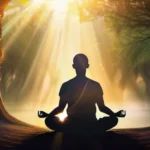Explore the unique blend of Eastern philosophies, martial arts, and personal growth that defined Bruce Lee’s spiritual journey.
Bruce Lee was not just a martial artist; he was a philosopher, an actor, and a spiritual seeker. This article delves into the unique spiritual path that shaped his life and work.
The Influence of Taoism on Bruce Lee
Imagine standing at the crossroads where East meets West, where philosophy intertwines with physical combat—this was the essence of Bruce Lee’s spiritual journey. How did Taoism shape his martial arts philosophy? Could it be that Taoism, with its principles of naturalness and non-action, mirrored the way Bruce approached martial arts?
Consider this: if Taoism is like a flowing river, ever-changing yet constant, how did Bruce translate this fluidity into his fighting style? His approach to Jeet Kune Do was not just about techniques; it was an embodiment of effortless action. Bruce believed that by aligning with the natural flow of energy, one could move more efficiently and effectively.
The Tao Te Ching speaks of living in accordance with nature. Could this be how Bruce saw martial arts—not as a rigid set of rules but as a flexible path to understand the body’s inherent movements? By embracing the way of water, which can shape itself around obstacles, Bruce Lee could adapt and change on a whim, much like Taoist philosophy suggests adapting to life’s unpredictable currents.
Moreover, how did this philosophical blend influence his training routines? Was there ever a moment when he stopped fighting or training, just as the Taoists might suggest we should cease struggling against nature? Bruce Lee’s relentless pursuit of perfection could be seen as a constant dance with Dao, always seeking harmony and balance.
In essence, by integrating Taoist principles into his martial arts, Bruce Lee created something new—a philosophy that transcends mere fighting. It’s about finding one’s true self through movement, just as the river finds its own path to the sea. And in doing so, he showed us that the way of the warrior is not only a physical journey but also a deeply spiritual one.
How do you see Bruce Lee’s integration of Taoism into his martial arts philosophy? Can we find these same principles guiding our own paths in life?
Bruce Lee’s Interpretation of Jeet Kune Do
Bruce Lee’s interpretation of Jeet Kune Do was more than just a martial art; it was a profound reflection of his spiritual beliefs and personal growth journey. Imagine Jeet Kune Do as a canvas, with Taoism providing the vibrant hues and the brushstrokes, but Bruce Lee himself was the artist, adding the dynamic lines that shaped its unique form.
Jeet Kune Do, which means ‘the way of the intercepting fist,’ is not just about physical techniques. It’s a philosophy that emphasizes adaptability, directness, and efficiency—principles deeply rooted in Bruce Lee’s spiritual quest for self-improvement. In this martial art, Bruce Lee saw an opportunity to blend Eastern philosophies with his personal beliefs, creating something that was both innovative and transformative.
One of the key concepts in Jeet Kune Do is the idea of non-doing. This concept, borrowed from Taoism, encourages practitioners to be fluid and spontaneous, moving with the flow rather than rigidly adhering to set rules. Bruce Lee often asked himself, ‘How can I move like water?’—a question that reflects his desire for flexibility in both his martial arts practice and life.
Another crucial aspect of Jeet Kune Do is its emphasis on non-stereotyping. Bruce Lee believed that traditional martial arts were often overly structured, which could hinder a practitioner’s ability to adapt. By embracing the idea of not being confined by rigid forms or techniques, Bruce Lee sought to create a more natural and efficient method of self-defense.
In essence, Jeet Kune Do for Bruce Lee was about finding one’s own path, much like navigating through a dense forest where each tree, rock, and stream demands a different approach. It’s about understanding the landscape of life and adapting your movements to suit it perfectly. This philosophy mirrored his broader belief in individuality and self-discovery.
By combining Taoist principles with his own experiences, Bruce Lee crafted Jeet Kune Do into a unique form that not only revolutionized martial arts but also provided a template for personal development. It’s a reminder that our spiritual paths are as diverse and varied as the individuals who walk them.
The Impact of Buddhism on Bruce Lee’s Philosophy
Bruce Lee was more than just a martial arts legend; he was a philosopher and spiritual seeker whose journey deeply intertwined Eastern philosophies, particularly Buddhism. As we delve into his philosophy, it’s almost as if we’re exploring the heart of a complex puzzle where every piece fits perfectly to reveal a broader picture.
How did Buddhism shape Bruce Lee’s outlook? Consider this: Buddhism teaches the concept of emptiness, or śūnyatā. For Lee, this meant embracing fluidity and adaptability in his martial arts. Wasn’t it his belief that one should be able to change form like water? Just as water can take any shape but remains water, a martial artist must adapt their techniques without losing the essence of their art. This idea was a cornerstone of Jeet Kune Do, his philosophy and martial art.
Buddhism also emphasizes mindfulness and awareness, which became crucial in Lee’s life. He believed that true mastery lies not just in physical prowess but in mental clarity and presence. How many times has he mentioned the importance of being in the moment, like a leaf dancing on the breeze? This is more than just a poetic metaphor; it’s a call to live fully, to be aware of each breath and every action.
Lee once said, “The art of war is based upon deception.” In the context of his philosophy, this statement resonates deeply. Deception here doesn’t mean trickery but rather the artful blending with your surroundings, much like water adapting to its container. This fluidity in thought and action was a manifestation of Lee’s spiritual beliefs, where one learns to move effortlessly through life’s challenges.
Through these teachings, Bruce Lee encouraged his followers to find balance, not just in their lives but also within themselves. He believed that true wisdom comes from the integration of mind, body, and spirit, much like the harmony found in nature itself. As we continue on this journey through Lee’s philosophy, one can’t help but see how deeply rooted these teachings are in his life and legacy.
Bruce Lee’s Concept of ‘Be Water, My Friend’
Imagine Bruce Lee as a river flowing through a dense, uncharted forest. Just like water adapts to its surroundings and finds its way around obstacles, Bruce Lee’s philosophy was about adapting to life’s challenges while maintaining fluidity and flexibility. This famous phrase ‘Be water, my friend,’ encapsulates his spiritual belief in the importance of adaptability and continuous flow in the face of adversity.
Water is both strong yet gentle; it can carve through stone over time or simply flow around an obstacle with ease. For Bruce Lee, this was a metaphor for life—embracing change, adapting to new situations, and finding the path of least resistance. It’s not about being rigid or stubborn but rather understanding that sometimes bending is what keeps you from breaking.
Consider how water reflects its surroundings; it mirrors the environment around it without losing its essence. Similarly, Bruce Lee believed in blending with one’s environment to achieve harmony and balance. His teachings encouraged students to understand themselves deeply and then move with grace and efficiency, just as a river moves through nature.
This philosophy was not just about martial arts; it extended into his personal life and spiritual journey. By embracing the fluidity of water, he found a way to live more fully and authentically—always open to new experiences and ready to change course when necessary. In essence, being ‘water’ meant being present, adaptable, and in tune with one’s surroundings.
The next chapter will delve deeper into the role of self-cultivation in Bruce Lee’s spiritual journey, exploring how he integrated these beliefs into his daily practices to enhance personal growth. For now, let us ponder: could we all benefit from embracing a bit more fluidity and adaptability in our lives?
The Role of Self-Cultivation in Bruce Lee’s Spiritual Journey
How can we understand Bruce Lee’s spiritual journey without delving into the heart of self-cultivation? For Bruce Lee, self-cultivation was not just a practice but a way of life, much like shaping clay to form a masterpiece. Just as an artist refines their craft over time, Lee honed his body and mind through rigorous training and introspection.
Self-cultivation for Bruce Lee meant more than just mastering the martial arts; it was about becoming aware of one’s limitations and pushing beyond them. How can we ever fully grasp our potential if we do not continually challenge ourselves? He believed that true mastery lay in understanding oneself, both physically and mentally, and using this knowledge to grow.
The concept of self-cultivation for Lee was deeply intertwined with Eastern philosophies, particularly those of Taoism. He often spoke about the fluidity and adaptability of water as a metaphor for life’s ever-changing nature. Much like water, one must be adaptable, yet maintain their principles—a delicate balance indeed.
Through his rigorous training methods, Lee emphasized the importance of continuous improvement and self-reflection. He believed that every moment offered an opportunity to learn and grow, whether through physical practice or philosophical reflection. This constant evolution mirrors the growth of a tree, with each branch and leaf contributing to its overall strength and resilience.
For Bruce Lee, self-cultivation was a journey of self-discovery and enlightenment. He saw it as a path that led to greater understanding and inner peace. How can we achieve such profound insights without dedicating ourselves to the process of self-improvement?
The Legacy of Bruce Lee’s Spirituality
How does one measure the impact of Bruce Lee’s spiritual journey on martial arts, philosophy, and personal development? It’s like asking how a single drop of water can shape a vast ocean. Bruce Lee was more than just a martial artist; he was a philosopher who embodied the essence of Jeet Kune Do, a philosophy that transcends physical combat to embrace life itself.
Imagine if you will, a bridge connecting the mountains of Zen and the valleys of Confucianism. Bruce Lee’s spiritual path was this bridge, meticulously crafted with principles from Eastern philosophies like Taoism and Buddhism, alongside the rigorous discipline of martial arts. Through his journey, he questioned the traditional hierarchies in martial arts and philosophy, much like a river breaking free from its banks to find new courses.
Lee’s approach to personal development was not just about mastering techniques but about understanding oneself deeply. He often asked, ‘What is true power?’ It wasn’t merely physical strength but rather the ability to adapt, learn, and grow. This philosophy resonated with many who were disillusioned with rigid traditions and sought a more flexible path.
His influence on modern martial arts cannot be overstated. Bruce Lee’s Jeet Kune Do became a beacon for practitioners worldwide, encouraging them to explore their own styles of combat without the constraints of fixed forms or dogmas. It’s as if he opened up a map, showing others that there are countless paths to follow, each leading to personal enlightenment.
In summary, Bruce Lee’s spiritual journey left an indelible mark on martial arts, philosophy, and personal development. His legacy is not just in the techniques he pioneered but in the way he challenged us to think deeply about our own growth and evolution. Through his questions and metaphors, he invited everyone to walk their own path, making his teachings as relevant today as they were when he first shared them.
Conclusion
 By understanding Bruce Lee’s spiritual journey, we can gain insights into his teachings and apply them to our own lives.
By understanding Bruce Lee’s spiritual journey, we can gain insights into his teachings and apply them to our own lives.











